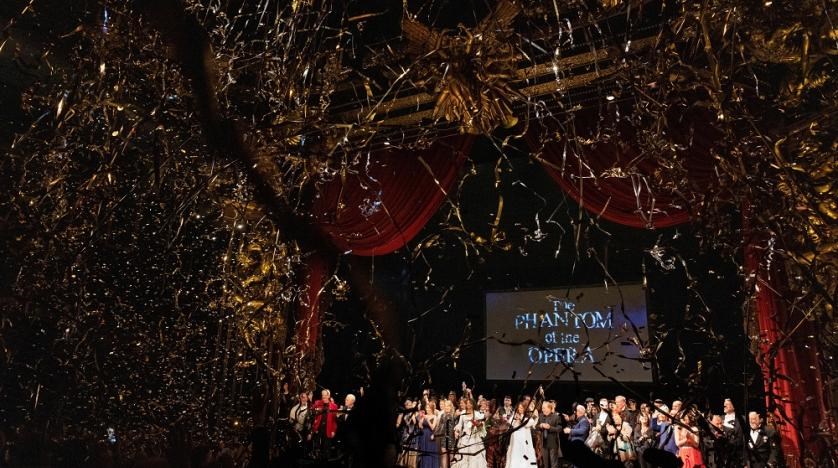The curtain is down for Broadway's ‘Phantom of the Opera’
On Sunday night, the show's record-breaking 35-year Broadway run came to an end. After its moving final performance, its iconic chandelier was given a bow, and its composer, Andrew Lloyd Webber, gave an overwhelming bow.
-

Cast and crew members take a final bow as confetti is released after the final performance of the Phantom of the Opera, which closes after 35 years on Broadway, in New York City, US, April 16, 2023. (Reuters)
The curtain fell on "The Phantom of the Opera," the longest-running production in Broadway history, on Sunday, after 35 years and nearly 14,000 performances.
Since it debuted in January 1988, Andrew Lloyd Webber's majestic musical has astonished both locals and visitors to New York, standing as a representation of the renowned theater area.
Over three decades, 20 million people have watched the melodrama about a masked musical genius who haunts the Paris Opera House and whose heart aches for the young singer Christine, and ticket sales for it have brought in more than $1.4 billion.
But producers determined it was time to end the record-breaking run as the show struggled to recover from Broadway's 18-month suspension due to the Covid-19 outbreak.
Spectator Daniel Wright said that while he'd seen the show multiple times, the final night was "extraordinary."
"There were so many moments when I teared up, goose bumps, it was just a well-crafted show," the 56-year-old said as quoted by AFP.
"There are reasons why it has been around for 35 years. It's a timeless classic, it has touched so many people's lives."
The play, which was adapted from the same-titled French novel by Gaston Leroux, won seven 1988 Tony Awards, including best musical, and on January 9, 2006, it surpassed all previous Broadway productions in terms of duration.
The production believes that over the years, it has employed around 6,500 people, including 450 performers. The 13,981st performance took place on Sunday in front of a sold-out audience at the Majestic Theatre near Times Square.
As Lloyd Webber and the original and current cast members took the stage for the last curtain call, the 1,600-person crowd stood and cheered passionately.
The septuagenarian British composer said, "Thank you all, thank you everybody, and thank you New York for being such a wonderful home for us."
Despite having numerous mega-fans, the show's Broadway run came to an end due to low attendance after Covid-19. The tardy return of foreign tourists to the Big Apple following the pandemic, according to British producer Cameron Mackintosh, who spoke to the New York Times in September of last year, caused the show to suffer from losses.
A contributing cause was the increase in production expenses, which reached $950,000 net per week.
The musical, which has one of its most iconic sequences in which a chandelier falls to the stage, requires roughly 125 performers, musicians, and technicians to perform.
"There comes a point, with any show, where there is a tipping point, where the number of good weeks has declined sufficiently that actually it's outweighed by the number of losing weeks, and at that point, there's only one sensible decision to make," Mackintosh said.
Nevertheless, Mackintosh emphasized the success of the show during the curtain calls.
"In our wildest childhood dreams, we could never imagine the success of Phantom," he said.
The ticket demand increased after it was revealed that "Phantom" would end its show, and the termination date was ultimately moved from February to April.
The remaining seats were going for more than $500 on ticket marketplaces in the days before this week's final performance.

 3 Min Read
3 Min Read








